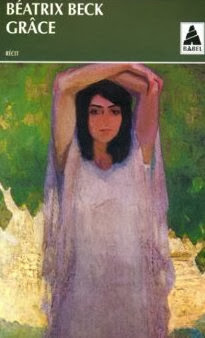In Béatrix Beck: Léon Morin, prêtre (Paris: Gallimard, 1952) / The Passionate Heart, translated from the French by Constantine Fitz Gibbon (New York: Julian Messner, 1953), we follow Barny (based on the author), living in Occupied France during the Second World War as she cares for her daughter France (based on Bernadette Szapiro). The novel, written in a sparse but absorbing style, provides a fascinating window into the time, place and people.
A good part of the novel revolves around the intellectual and social relationship that develops between Barny and Léon Morin, a priest. There's a lot of back and forth as Barny seeks to both stay alive during wartime, protect her daughter, and develop existentially as a human being. At first she's furtive with Morin, who early on responds: "'Do you never feel the need to exchange ideas with your equals? What a savage!'" (Gibbon translation, page 65).
A little later, we learn what happened to Barny's (Jewish) husband: "Without being asked, I . . . told him that my husband had died in the war, probably through suicide. I anticipated that the priest would show shocked horror or would express pity. He did neither, simply saying: 'Yes, there have been many marriages broken.'"
Barny likes Morin, certainly, but initially wonders why he takes the time to chat with her at all: "'How can you include me, spiritually, among your sisters, since they're presumably Christian and I'm not?'
'What's that got to do with it? Nothing, nothing at all.'" (Gibbon translation, pages 74-75).
Given the wartime setting, there's a lot of background as well as internal energy that drives the novel. Not incidentally, Léon Morin, prêtre was adapted into a very fine black and white movie by Jean-Pierre Melville (released in 1961) as well as a French TV version in 1991.
I tend to like stories that focus on women or priests living through a time of crisis, so this was a double winner for me.
Today's Rune: Journey.
A good part of the novel revolves around the intellectual and social relationship that develops between Barny and Léon Morin, a priest. There's a lot of back and forth as Barny seeks to both stay alive during wartime, protect her daughter, and develop existentially as a human being. At first she's furtive with Morin, who early on responds: "'Do you never feel the need to exchange ideas with your equals? What a savage!'" (Gibbon translation, page 65).
A little later, we learn what happened to Barny's (Jewish) husband: "Without being asked, I . . . told him that my husband had died in the war, probably through suicide. I anticipated that the priest would show shocked horror or would express pity. He did neither, simply saying: 'Yes, there have been many marriages broken.'"
Barny likes Morin, certainly, but initially wonders why he takes the time to chat with her at all: "'How can you include me, spiritually, among your sisters, since they're presumably Christian and I'm not?'
'What's that got to do with it? Nothing, nothing at all.'" (Gibbon translation, pages 74-75).
Given the wartime setting, there's a lot of background as well as internal energy that drives the novel. Not incidentally, Léon Morin, prêtre was adapted into a very fine black and white movie by Jean-Pierre Melville (released in 1961) as well as a French TV version in 1991.
I tend to like stories that focus on women or priests living through a time of crisis, so this was a double winner for me.
Today's Rune: Journey.









2 comments:
No blowing up of Nazi bases and such? I like a little action with my existentialism. :)
Eric-it's true that that can be a complex relationship. It's a mix of human and mystique qualities!
Post a Comment